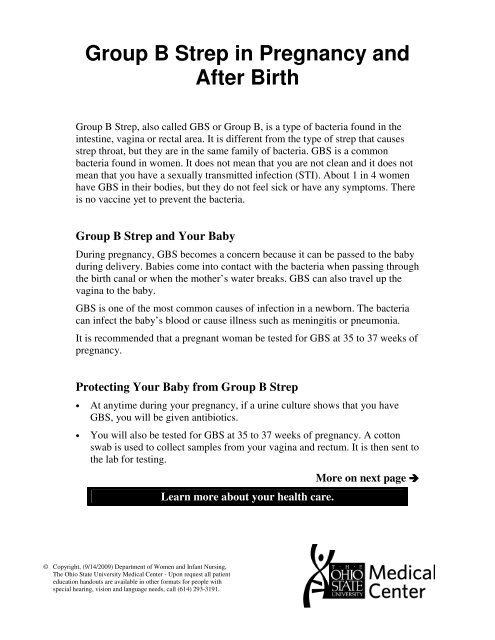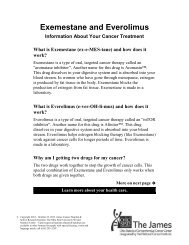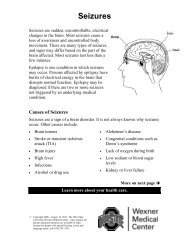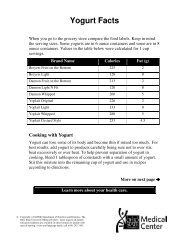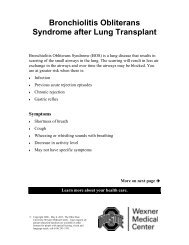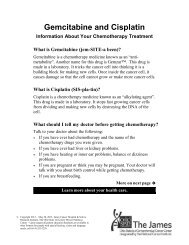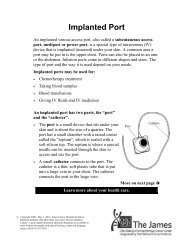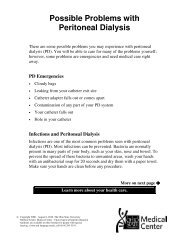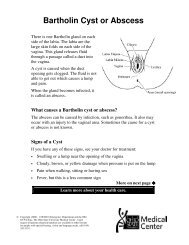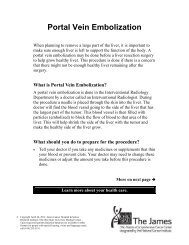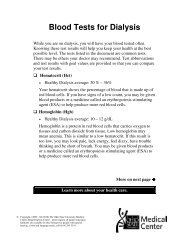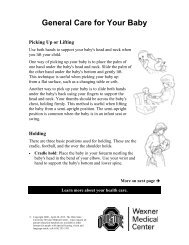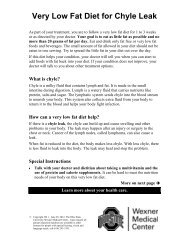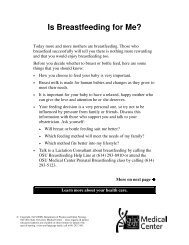Group B Strep in Pregnancy and After Birth - Patient Education Home
Group B Strep in Pregnancy and After Birth - Patient Education Home
Group B Strep in Pregnancy and After Birth - Patient Education Home
You also want an ePaper? Increase the reach of your titles
YUMPU automatically turns print PDFs into web optimized ePapers that Google loves.
<strong>Group</strong> B <strong>Strep</strong> <strong>in</strong> <strong>Pregnancy</strong> <strong>and</strong><br />
<strong>After</strong> <strong>Birth</strong><br />
<strong>Group</strong> B <strong>Strep</strong>, also called GBS or <strong>Group</strong> B, is a type of bacteria found <strong>in</strong> the<br />
<strong>in</strong>test<strong>in</strong>e, vag<strong>in</strong>a or rectal area. It is different from the type of strep that causes<br />
strep throat, but they are <strong>in</strong> the same family of bacteria. GBS is a common<br />
bacteria found <strong>in</strong> women. It does not mean that you are not clean <strong>and</strong> it does not<br />
mean that you have a sexually transmitted <strong>in</strong>fection (STI). About 1 <strong>in</strong> 4 women<br />
have GBS <strong>in</strong> their bodies, but they do not feel sick or have any symptoms. There<br />
is no vacc<strong>in</strong>e yet to prevent the bacteria.<br />
<strong>Group</strong> B <strong>Strep</strong> <strong>and</strong> Your Baby<br />
Dur<strong>in</strong>g pregnancy, GBS becomes a concern because it can be passed to the baby<br />
dur<strong>in</strong>g delivery. Babies come <strong>in</strong>to contact with the bacteria when pass<strong>in</strong>g through<br />
the birth canal or when the mother’s water breaks. GBS can also travel up the<br />
vag<strong>in</strong>a to the baby.<br />
GBS is one of the most common causes of <strong>in</strong>fection <strong>in</strong> a newborn. The bacteria<br />
can <strong>in</strong>fect the baby’s blood or cause illness such as men<strong>in</strong>gitis or pneumonia.<br />
It is recommended that a pregnant woman be tested for GBS at 35 to 37 weeks of<br />
pregnancy.<br />
Protect<strong>in</strong>g Your Baby from <strong>Group</strong> B <strong>Strep</strong><br />
• At anytime dur<strong>in</strong>g your pregnancy, if a ur<strong>in</strong>e culture shows that you have<br />
GBS, you will be given antibiotics.<br />
• You will also be tested for GBS at 35 to 37 weeks of pregnancy. A cotton<br />
swab is used to collect samples from your vag<strong>in</strong>a <strong>and</strong> rectum. It is then sent to<br />
the lab for test<strong>in</strong>g.<br />
© Copyright, (9/14/2009) Department of Women <strong>and</strong> Infant Nurs<strong>in</strong>g,<br />
The Ohio State University Medical Center - Upon request all patient<br />
education h<strong>and</strong>outs are available <strong>in</strong> other formats for people with<br />
special hear<strong>in</strong>g, vision <strong>and</strong> language needs, call (614) 293-3191.<br />
Learn more about your health care.<br />
More on next page
Page 2<br />
• If you test positive for GBS at anytime dur<strong>in</strong>g your pregnancy, you will be<br />
given IV (<strong>in</strong>travenous) antibiotics <strong>in</strong> a ve<strong>in</strong> when your labor beg<strong>in</strong>s or your<br />
water breaks. This medic<strong>in</strong>e is given to stop the bacteria from spread<strong>in</strong>g to<br />
your baby dur<strong>in</strong>g birth.<br />
Antibiotics for GBS may also be given if you have had a baby with GBS <strong>in</strong><br />
the past or if your GBS status is not known.<br />
Ampicill<strong>in</strong> is the drug most often used to treat GBS. It is safe <strong>and</strong> prevents<br />
<strong>in</strong>fection <strong>in</strong> newborns. If you are allergic to ampicill<strong>in</strong> or penicill<strong>in</strong>-like<br />
medic<strong>in</strong>es, tell your doctor. Other antibiotics can be given.<br />
• Once treated for GBS, you may breastfeed your baby. If you have any<br />
concerns, talk with your doctor or nurse.<br />
Signs of <strong>Group</strong> B <strong>Strep</strong> <strong>in</strong> Your Baby<br />
In the hospital, your baby will be checked after birth for GBS. Medic<strong>in</strong>e is not<br />
needed unless your baby tests positive. Your baby will be checked aga<strong>in</strong> at his or<br />
her first wellness visit. Signs of GBS most often occur the first week of life. Call<br />
your baby’s doctor if you see any of these signs:<br />
• A temperature of less than 97.4 degrees F or a fever greater than 99.5 degrees<br />
F when taken under the arm<br />
• Trouble breath<strong>in</strong>g<br />
• Baby does not wake up for feed<strong>in</strong>gs<br />
• Baby has problems with movement, such as stiff or tight arms <strong>and</strong> legs, or<br />
lack of muscle control<br />
• Baby’s color may change from p<strong>in</strong>k (normal) to pale, grey or look blue.<br />
• Baby may not eat well<br />
If you have any questions or concerns about your baby, please ask for help.<br />
• In the hospital, put the call light on or call your nurse.<br />
• At home, call your baby’s doctor if your baby has any signs of GBS. Call<br />
911 if your baby is hav<strong>in</strong>g trouble breath<strong>in</strong>g.<br />
Talk to your doctor or others on your health care team if you have<br />
questions. You may request more written <strong>in</strong>formation from the Library<br />
for Health Information at (614) 293-3707 or email: health-<strong>in</strong>fo@osu.edu.


